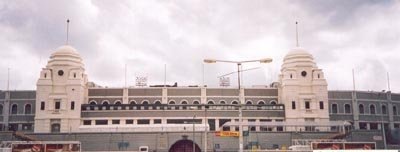
Image credits Derek Redmond and Paul Campbell
A few days ago, I noticed a comment that a friend had made on Facebook; he said “My friend ——-‘s wife is in Woodstock” and proceeded to link to a still where she is shown as a 14-year-old at the event at Max Yasgur’s farm forty years ago.
And it made me think. Wouldn’t it be fitting, in an ironic kind of way, to crowdsource crowds? What do I mean?

Well, let’s take Wembley, 30th July 1966. The FIFA World Cup Final. There’s been an apocryphal tale going around that if you counted all the people who say they were there to watch England win, it would be many multiples of the actual number at the ground: the official attendance was 98,000.
Wouldn’t it be an interesting experiment to start a wiki page, perhaps on Wikipedia, allowing people to name people they knew were at the game, slowly building up to the 98,000? A virtual gathering of event-alumni, as it were.
Wembley and Woodstock represent different challenges, but perhaps none more so than Dealey Plaza, 22nd November 1963. I don’t mean this to be a Warren Commission or any sort of conspiracy theory resuscitation, just an attempt to form a historical record of who was there.

I may be blowing smoke with my three examples above, but the principle is all I wanted to establish. Using crowdsourcing to annotate and confirm the attendance at historical events where no other form of attendance verification is possible.
People tend not to go to such events alone. People tend to notice who’s next to them, who else they spoke to. And we now have the tools to collate that collective knowledge.
I see a number of benefits:
- First and foremost, by identifying those present, it is possible to create first-hand and then and share eyewitness accounts for momentous events, perhaps again using Wikipedia
- Secondly, researchers will have a well-defined base of people to talk to; this is particularly important for those events where the participants are approaching the end of their lives
- Thirdly, I think there is some inestimable value in bringing together these event-alumni, even if only vicariously and virtually. Friendships could blossom, support groups could emerge, new facts could see the light of day.
This isn’t necessarily going to happen without some catalysis. For many historically important events where we still have eyewitnesses, the clock is ticking; so we may need volunteer grandchildren and great-grandchildren to collect and collate the information. But I think it’s worth it.
What do you think? Worth doing? Please comment away.